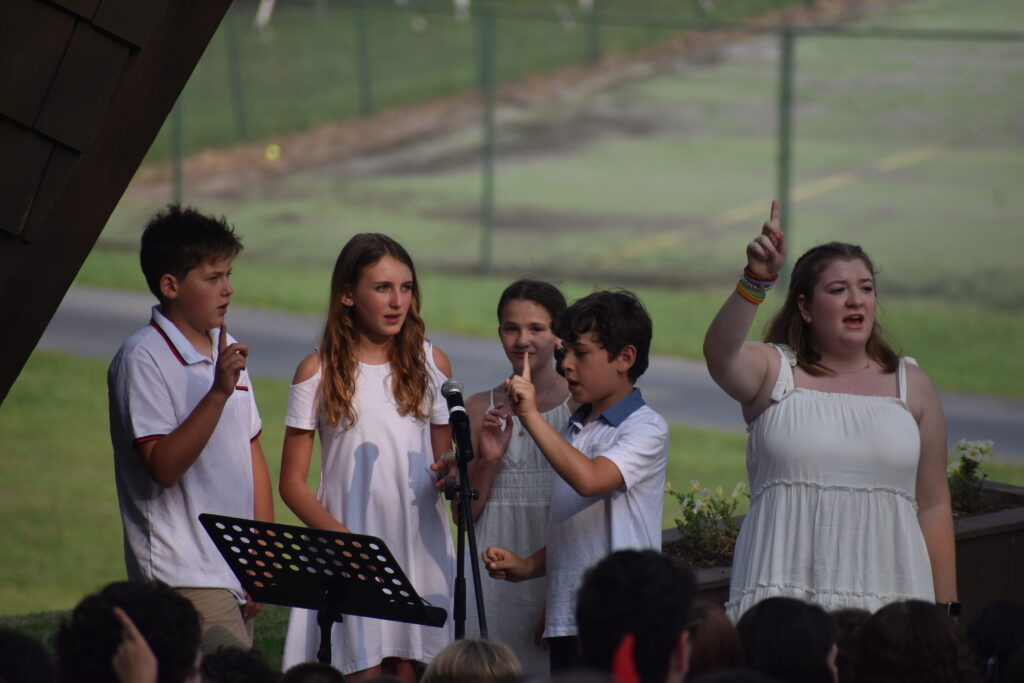 Hear the words of our Kineret and K’Far Noar campers who spoke this past Shabbat about our Middah of Simcha, Joy. Services this weekend featured a D’Var Torah from Associate Director, Amy Kagan.
Hear the words of our Kineret and K’Far Noar campers who spoke this past Shabbat about our Middah of Simcha, Joy. Services this weekend featured a D’Var Torah from Associate Director, Amy Kagan.
Kineret’s Friday Night Service
Sophia, Maya, Alana, Olivia, Gali
Alana—Our middah this week is simcha, finding joy.
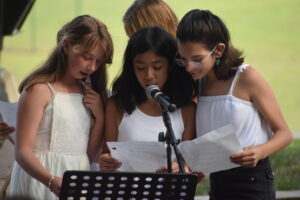
Maya—Finding joy can be in many different ways, either finding joy in yourself, or finding joy in what you do.
Gali—You can find joy in the little things or big things. You can find joy in yourself by getting your favorite candy, or you can be joyful when you are on vacation. You don’t have to be joyful just for big things. It can be for the little things too.
Sophia—You can give joy to others too. To give people joy you can let someone borrow your towel if they don’t have one. Another way to give someone joy is by sharing your snack if they drop theirs. You can give joy to others in many ways.
Olivia-We can find joy in our community by helping others and letting others help us. Always make sure you’re finding joy in your community and yourself.
Alana—If you’re feeling down you can do something as simple as treating yourself to ice cream, or
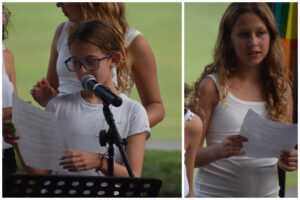
talking with friends. Sometimes finding joy can be a struggle. Once when I was feeling down, I needed help to find joy in myself, and my friend helped me find that joy.
A lesson about simcha, is to always try to find joy in yourself and others.
Lev, Ori, Max
LEV: This is my first year at Camp Harlam. It was tough being in a new place at first. The way I was able to find Simcha is sports.
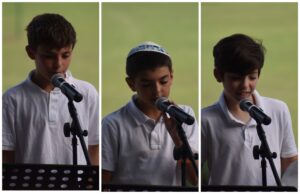
ORI: This is my second year at Camp Harlam, and one way I find Simcha is with my friends whenwe play all sorts of games and sport.
MAX: This is my second year at Camp Harlam.
We can find Simcha while praying. Simcha can be hard to find or easy to find. When we sing the Bar’chu, we can find joy i
n God and in ourselves.
One way I find Simcha is by doing one thing that makes me happy every day. For example, I find joy every day learning new abilities that change me as a person.
As we pray the Bar’chu, I invite you to consider: How do you find Simcha?
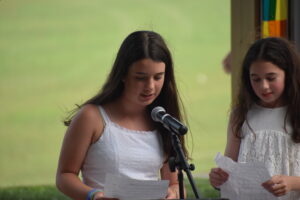
Elianna and Naomi
N: For both of us this is our first year at Harlam.
E: Camp is super amazing, but if you think about it, what makes it so amazing isn’t where we live, it’s what we live around.
N: Nature is what makes camp so beautiful.
E: With no imagery surrounding us, no one can bond because nature is what keeps our world alive.
N: Next time you step outside, take a deep breath and imagine a world without nature- it would be horrible. Nature is what gives us Joy.
E: Also, studies show that if you continuously go outside for 30minutes minimum every day, you’ll be a whole lot happier than if you stay inside.
N: With nature in camp we can do so many things.
E: This is very important to us because the meaning of the Maariv Aravim prayer is finding holiness in nature.
N: Nature makes us happy.
E: Finding joy in Nature is especially easy when you’re surrounded by friends in Camp Harlam.
Layla, Dani
L: In a moment we’ll sing Hashkeinu, which is about Shelter and Peace. This prayer reminds us of our community at Camp Harlam.
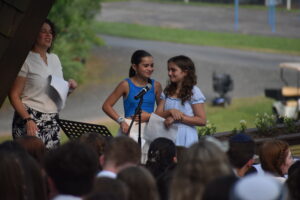
D: Community can be overwhelming and scary, but when you decide to push through, it can feel like a source of safety
L: And when we remember why we’re at Shabbat to express ourselves to be together and join together, it feels like a source of comfort.
D: And when you think about it, everyone might feel this way. The two of us met at a Shabbat
service.
L: And our friendship has also become our source of peace and protection.
TOGETHER: We now join together in Hashkiveinu.
Josie, Liv
J: Our Middah for this week is Simcha, finding Joy.
L: I find joy by spending time with my friends and family.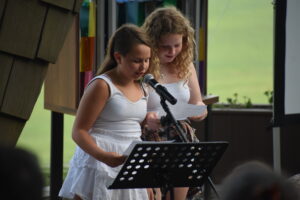
J: And I find joy in performing and making music.
L: Everyone finds joy in different things.
J: For example, you can find joy in being yourself around new or different people.
L: And having self-confidence.
J: I found joy when me and Liv met each other.
L: We begin Amida by asking God to open our lips and let us say joyous things.
J: We hope you can find joy in the rest of your summer.
Michael, Ezra, and Caleb
The Middah for our unit this week is simcha which means finding joy. Camp Harlam is a place where joy happens most of the time. When we think about it, we can find joy anywhere, even when at first things are rough and it seems that joy will be hard to find.
Earlier this week, our bunk found joy when we had non-stop bunko because of the rain. At first it was normal bunko where we found joy by just hanging out. But later that day we got stuck in the Ulam for two and a half hours because of the rain and tornado warning. It got very boring very quickly. We didn’t have our stuff, there was a ping-pong table with paddles but no ping pong balls. We just tried to entertain ourselves but in such a small space there was nothing to do. We were not experiencing joy. We then realized that we had a volley ball we could use. We started just throwing it around, then we got a game of newcomb going. That game made the time pass so much faster. Even though we were stuck in the Ulam, we found joy again
To find joy all the time, make sure you carry something fun to do that will help pass the time if you are stuck somewhere. And if you don’t have anything, make the best of it. You can find joy anywhere as long as you can find some way to have fun.
D’Var Torah from Amy Kagan, Associate Director
Shabbat Shalom!
I wanted to share this poem by Matt Starking with you as we enter into Shabbat and we think about our
week ahead and all that we can accomplish,
When obstacles seem endless,
And success appears impossible,
Do not give up, keep trying.
When the road ahead is rocky,
And progress seems slow,
Do not relent, keep trying.
When failure looms large,
And disappointment is all you feel,
Do not lose heart, keep trying.
For every great achievement,
Began with a single step,
And every step taken,
Brings you closer to your goal.
Remember, success is not immediate,
It is earned with patience and perseverance,
So keep pushing through the challenges,
And one day you will see the fruits of your labor.
So keep trying, keep moving forward,
Believe in yourself, and never give up,
For the journey may be tough,
But the reward in worth the struggle.
As we keep trying and moving forward, lets continue to find joy in our experiences and success each and
every day.
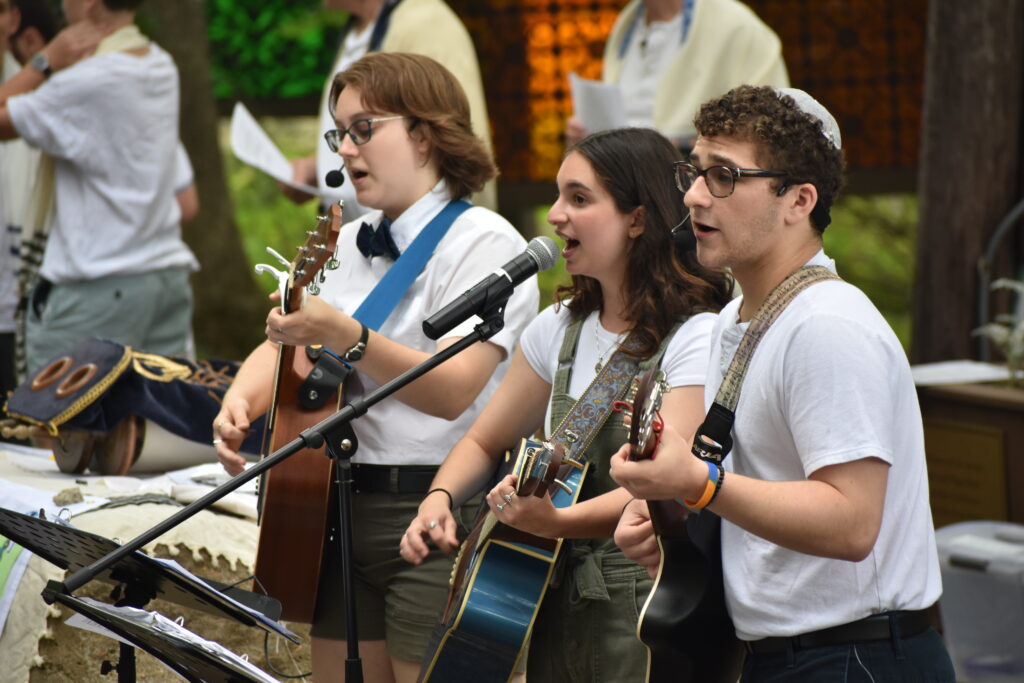
K’Far Noar’s Saturday Morning Service
Noa and Tali
Noa: This week’s middah is Nitzachon, pushing through a challenge. So naturally we wanted to do something about adventure, but we’re in Kfar now, so we can’t. Instead, we started arguing about what to actually write about! Our argument went from my suggestion that we should write a poem, to her telling me we should just still do adventure.
Tali: In the end, we both realized that this was our current challenge… writing this speech. So we decided, rather than focus on one challenge, we would take a look at all of our challenges. Some things like living in the old bunks, living with all of the hillside campers…
Noa: … and freezing cold showerd; you know, that kind of stuff. The thing about challenges is that you can overcome them. We pushed through figuring out our topic for this speech, living in the old cabins, and many more things. You have to really embrace your challenges in order to overcome them.
Tali: Challenges exist everywhere, you have to face them head-on. We challenge you to push through your difficult moments and situations and then find pride in your accomplishments!
Ziva and Sophia
Ziva: Everybody has to push through challenges.
Sophia: Whether it’s school, family, or even friendships. We have known each other since Carmel, and like many others, we have had our fair share of issues.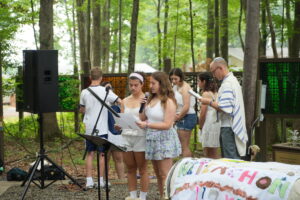
Ziva: Last year in Galil we were placed in separate bunks, something that has never happened to us before. Though we were upset about it, we didn’t expect it to be difficult. We discussed how we would still talk to each other and though it was different we still had high hopes that it would be a great year.
Sophia: Being in different bunks was harder than we thought it would be, and as we had so much time without one another, our minds swarmed with frustration and anger at each other for many things.
Ziva: Though we’ve gotten in small fights before, we were always able to talk through them, but this time around we distanced ourselves from each other too much to do that.
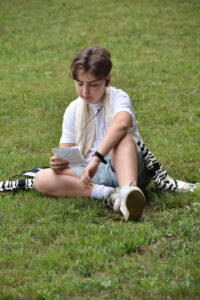 Sophia: This was our first year out of the 7 years at camp that we weren’t friends. This was so difficult for both of us as it felt so strange and saddening.
Sophia: This was our first year out of the 7 years at camp that we weren’t friends. This was so difficult for both of us as it felt so strange and saddening.
Ziva: Throughout the summer we made attempts to talk and while most failed, we were able to finally talk through the issues. But the summer was at its end and we concluded on not a bad, but an odd note.
Sophia: This year we are in Kfar, in the village, and in one bunk combined.
Ziva: Through the year, between last summer and this summer, we pushed through our challenge and made it a priority to become friends again, as close as we’ve always been.
Sophia: Though the year was hard, we don’t regret it, because pushing through this conflict only brought us closer and once again made it possible to call each other best friends.
Ziva: Doing this brought new light to our friendship.
Sofia, Ayla, Willow, and Jillian
Sofia: We come to camp for a lot of different reasons. To have fun, to see friends, and to disconnect.
Jillian: When out of camp we’re always encountering different stressors and problems. When we come to camp, we are able to heal from all of this.
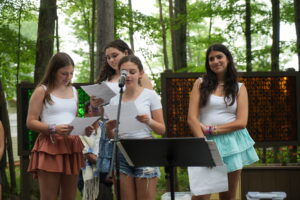
Ayla: It can be a challenge to let go of our problems, but every year we are able to overcome them and have a great summer.
Willow: During the Mi Shebeirach, reflect on how camp has helped you heal and overcome challenges.
Luci, Amy, Madison, Molly
Shabbat Shalom
Molly: It’s no question that camp is a special place where truly amazing friendships, form.
Luci: But with this blessing comes challenges. During the year it can be difficult to keep in touch and keep friendships alive.
Madison: We all live at least 2 hours from each other.
Amy: New York
Madison: Pennsylvania
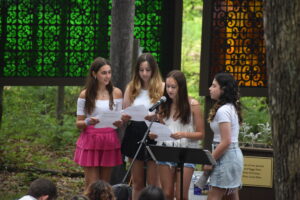
Luci: Maryland
Molly: Arizona
Madison: Camp has a special magic that is hard to recreate.
Amy: While being at home and navigating home life, prioritizing camp friendships can be difficult. We are able to call and text each other, but it isn’t the same.
Molly: We try to see each other throughout the year, but it isn’t easy. Pushing through this challenge during the year ends when we drive through the gates.
Luci: For us, we have found that pushing through this challenge has brought us closer together. We are able to enjoy and value our friendships more than we would have before.
Madison: We have learned the importance of friendship and in turn become better friends and people.
Amy: The middah for this Shabbat is Nitzachon, pushing through a challenge. We hope that during your time at camp, you push through and overcome challenges in order to become a better version of yourself.
Simon, Matty, Eli, Lee
Simon: A part of being a K’far camper is meeting our Kineret buddies. Even though we just met them, we were instantly called to be role models to them.
Lee: Now that we have become closer to our buddies we all have new friends that will last throughout our years of camp.
Matty: The Barchu is a call to prayer and just like we are getting called to prayer at this moment, we were called to be mentors to our Kinneret buddies.
Lilly, Jemmie, and Ellie
Lilly: This year, camp is very different for many of us.
Ellie: Now that we’re in senior camp, our bunks are no longer separated.
Jemmie: While the rainy weather and cold showers can be annoying, living as one unit, as a village, has also had its share of challenges.
Lilly: Limited space in the village can be a challenge for us, as well as learning to live with so many others – where some like things a little neater and others don’t mind a bit more of a mess.
Ellie: But with good communication and a willingness to help, we have worked together to fix these issues.
Jemmie: The greatest part of overcoming these challenges has been our ability to learn to appreciate and love one another.
Sadie, Ava, Reese, Liv
Sadie: As we now enter senior camp, our bunks have become one. We realized that after a number of summers that there are many people we have yet to connect with. It can be hard to branch out from your inner circle.
Reese: Since people have already formed close bonds, you may feel out of place. We know it may be difficult to adjust, but in the long run, you will create close friendships and memories that last a
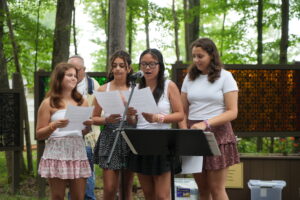
lifetime. We encourage you to have an open mind and connect with someone new.
Liv: You never know who you might meet and the impact you may leave on someone’s life. Overcome the challenge of reaching out by trying to put yourself out there. Have confidence in yourself and keep a positive mindset.
Ava: In addition, we would also like to recognize the connection we have to those who have come before us in the Camp Harlam community. We appreciate the hard work that was put into this special place and know that we wouldn’t be able to have these unique experiences if it were not for the previous generations.
Avery, Scarlett, Bailey
Bailey: Being in Kfar this year, we’re had to adjust to new bunks, colder showers, and a new camp experience.
Scarlett: Though these challenges may seem difficult at the moment, the ability to reflect and realize that these are just surface challenges gives us a new perspective.
Bailey: This teaches us valuable lessons on resilience and making the most of our time at camp.
Avery: Even though the day-to-day challenges of camp seem difficult on the surface, they teach us that challenges are just opportunities to grow.
Scarlett: The silent prayer is a time to reflect.
Avery: We hope that this moment will give you a chance to reflect on the lessons that challenges at camp have taught you.
Tyler, Alex, and Liza
Tyler: The word Nitzachon, pushing through a challenge, is a word that comes with highs and lows.
Alex: Over the years, challenges have increased from seemingly minor issues to taking on a deeper level.
Liza: These levels of challenges can include emotions, more people, and homesickness.
Tyler: A lesson that was extremely difficult to push through was having a mindset that there is always a light at the end of the tunnel.
Alex: When challenges occur, I want you to take a second and realize that more than likely, everything will be okay.
Liza: Camp is the perfect place to realize this valuable life lesson.
Tyler: Like how we have challenges during the week, but everything turns out okay at the end when we get to all come together and celebrate Shabbat.
Alex: Please use this Shabbat to reflect on the challenges you faced at camp and then take the time to realize, that in the end, everything was okay.
